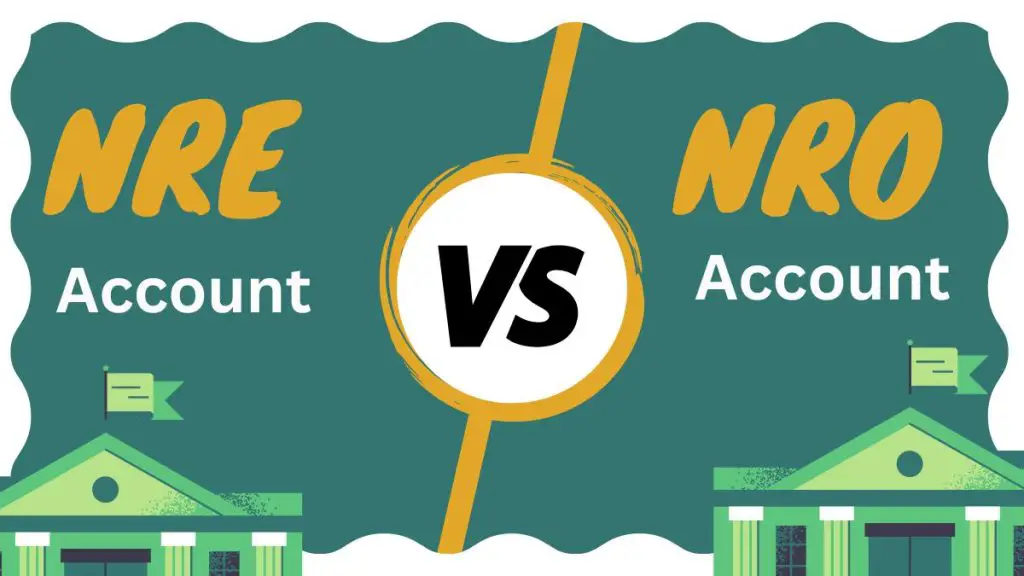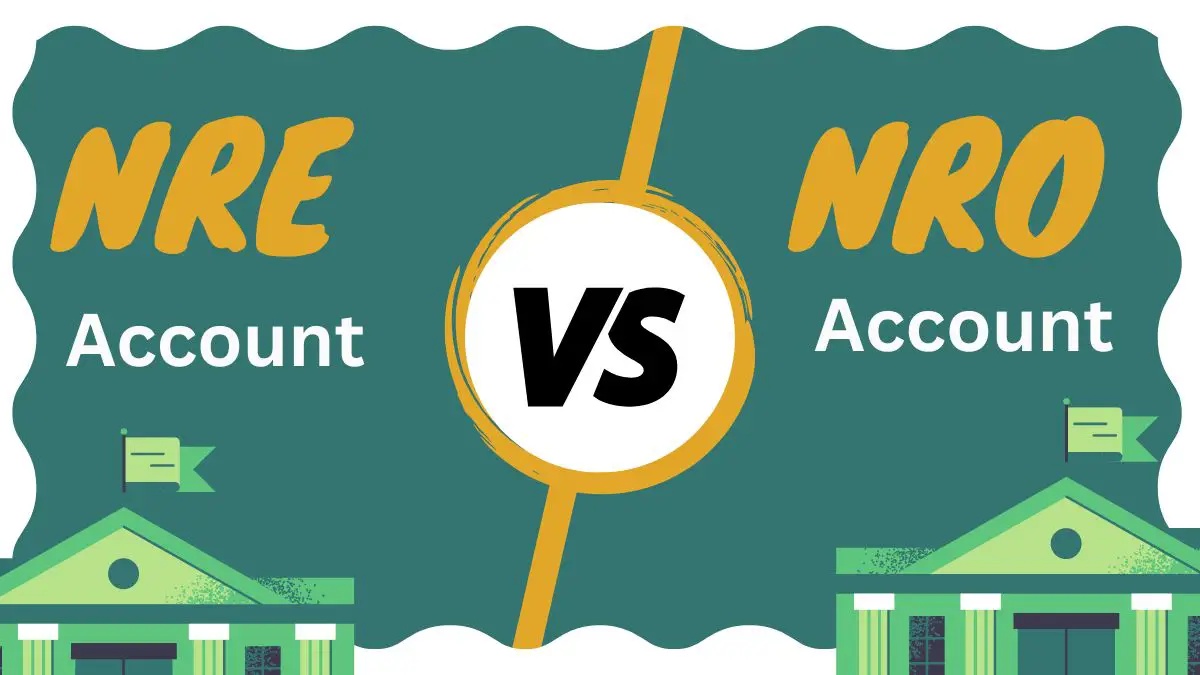NRE Vs NRO Account, An NRE account is a bank account opened in India in the name of an NRI, to park his foreign earnings; whereas, an NRO account is a bank account opened in India in the name of an NRI, to manage his Indian income. Incomes such as rent, dividends, pensions, and interest are included in this category. Below we will discuss and Compare Differences in detail.
Are you an NRI? It might not be easy to decide which product to choose because there are so many various kinds of goods and accounts on the market. Making an informed choice is easier if you understand the numerous options better. Knowing how to distinguish between the many options is also beneficial. You will be better positioned to decide where to put all your hard-earned money. Depending on your choices and needs, you can get higher returns on your investment.
As an NRI, you have access to two main types of accounts: non-resident external (NRE) and non-resident ordinary (NRO). They are among the most widely used solutions to cut costs. With this article we provide you all the important information related to NRE Vs NRO Account. So, just stuck with this article.

What is an NRE Account?
NRIs use foreign funds to open and maintain a Non-Resident External (NRE) Account, which is kept in rupees. The accounts may be maintained as savings accounts, current accounts, recurrent deposits, or fixed deposits.
You may deposit your international earnings into an NRE account from your home country if you have one. According to the current exchange rate, the sum placed in foreign currency is translated into Indian rupees.
Even if you are thousands of miles away, you may use a savings or current account to pay bills or write cheques for payments in India.
Another option is to designate an Indian citizen as your Power of Attorney (POA), who will have access to your account’s debit card and checkbook. You can put your foreign profits in an NRE deposit for a specified duration of one to three years, which is kept in Indian rupees.
In all situations, the translated rupee sums you send over earn you Indian interest rates, and both the principal and interest are tax-free in India. The interest rates on the accounts will be by the regulations set out by the Department of Banking Regulations.
The most alluring feature of an NRE account is that any payment is refundable and tax-free to your country of residence. Overall, NRE accounts offer tax-free remittance space, lots of liquidity, a simple way to pay for India’s costs, and a medium for investing in India.
Read Also: A Complete Guide on How to Open a Bank Account in the US

What is NRO Account?
Savings accounts, current accounts, recurring deposits, and fixed deposits are all examples of Non-Resident Ordinary (NRO) accounts. The account may be opened using foreign cash and Indian rupees, with the balance remaining in Indian rupees. Two NRIs may jointly own it or jointly own it with an Indian resident.
The account can also pay for local Indian expenses like phone, water, or energy bills. It is a suitable account to deposit the money into, for instance, if you own a flat in India with renters. The NRO account can accept transfers from other NRO accounts, specific cash quantities, and remittances from outside India.
This account is liable for all of India’s relevant taxes. An NRO account is a practical mechanism for NRIs to deposit their earnings in India and accept foreign contributions due to the tax event that would arise after repatriation.
The NRO account is ideal if you do not intend to transmit your balances outside India due to its limited repatriation and tax consequences. It may be viewed as a means of depositing revenue, like rent or profits, in India. If you wish to register an account together with someone who lives in India, it is also more advantageous.
The bank charges cost to manage both types of accounts. For details on your relevant fees, contact your bank.
Read Also: Citibank Promotions| Citibank Gift Card Earn $200 Cashback

How to open a NRE/NRO Account?
You can open an NRI account online or in person, NRO or NRE. On the websites of all the main commercial banks, there are online apps to start the procedure.
Usually, after providing your contact information, passport number, and current address, you are asked to fill out a form. Once this is done, the bank will call you to discuss the following steps.
NRO/NRE accounts are created in person at an Indian bank.
What are the necessary documents for opening an NRE/NRO account?
● a photocopy of a passport
● a copy of the PAN card,
● a copy of the PAN card, a copy of the visa, work permit, or permanent residence card
● one passport photo
● evidence of an international address
● a proof-of-address in India
But before you begin, confirm with your selected bank what exactly qualifies for each document and what their special requirements are.
Before sending the necessary papers to the bank branch in India, if you are eligible to be an NRI and are already residing abroad, you must have them confirmed by the Indian embassy or the signature authority of a commercial bank branch established in India.
It is preferable to open an account when you are really in India for your next vacation or business trip.
NRO/NRE Account Taxes
Taxes on interest income earned on NRE account balances are waived. India’s income and wealth tax regulations apply to balances in an NRO account.
You should know that this material is generally provided and shouldn’t be construed as tax advice. Please consult a tax professional before making any decisions since tax repercussions depend on you as an individual.
Differences between NRE Vs NRO Account
The following points highlight the key distinctions between NRE /NRO accounts:
1. Non-Resident External Rupee Account is referred to as an NRE account, while a Non-Resident Ordinary Rupee Account is referred to as an NRO account.
2. The NRIs can deposit their foreign-earned money into their NRE accounts. The term “NRO Account” refers to an account used mostly by NRIs to deposit money made in India.
3. Joint openings of NRE accounts are permitted. Hence two NRIs may open an account simultaneously. On the other hand, a combined NRO account can be opened by one Indian resident and one NRI.
4. Only foreign cash is deposited into an NRE account, and only Indian rupees are withdrawn. In contrast to NRO accounts, deposits are accepted in both Indian and international currencies, but withdrawals are only permitted in the Indian rupee.
5. NRE accounts earn less interest than NRO accounts do.
6. While NRO accounts‘ interest is subject to taxation, NRE accounts’ interest is not.
7. In an NRE account, principal and interest are withdrawn at any time. All current revenues, such as pension, rent, dividend income, etc., and remittances up to USD 1,000,000 every fiscal year are exceptions to the limits on the transfer of principle from India to another country. However, interest on NRO accounts is freely repatriable.

Similarities in NRE vs NRO Account
- Any bank account, such as savings, recurring, current, or term deposit, can be used for the two accounts.
- Both may be opened both collectively and separately.
- On both accounts, nominations are allowed.
Bottom Line
NRIs utilise the NRI/NRO accounts to save their hard-earned money in India. NRE accounts are intended to maintain savings in Indian rupees or to park money earned abroad, whereas NRO accounts are designed to keep money acquired from Indian sources in India. So, if you’re unsure which to choose, consider your demands and the advantages of each account’s features before deciding.



